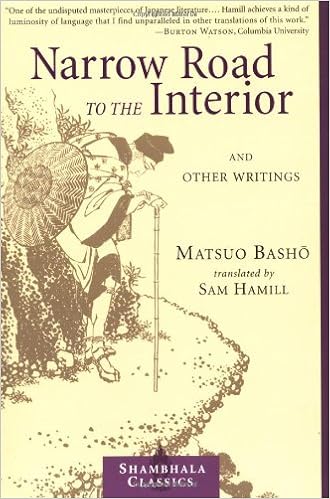Japanese poetry, from what I've read, is inevitably short. The forms in such poetry lend themselves only to brevity, moments of keen observation, epiphanies without with long stories leading into them. The best moments in Basho's haiku's are exactly that--statements one must ponder about in wonder before being able to move on.
This book features a selection of Basho's haiku, along with a few of his prose travel writings, many of which contain haiku within them and explanations of how those haiku arose. I'm not much of a fan of the travel writing. With the exception of Parker's The Oregon Trail and the Lewis and Clark journals (albeit in abridged form), I don't know that I've encountered any pre-twentieth-century travel writing I've greatly enjoyed--perhaps the observations of such early travelers rarely transfer to me in my context now. Even in the travel writing, Basho is at his best when he delivers to his readers tiny but profound observations that apply to all throughout time, such as this one from his Sarashina Travelogue: "Then the servant mounted the horse, ignoring the danger. He began to doze off and nearly tumbled over a cliff. With every nod of his head, I was stricken with terror. Thinking it over, I ralized that each of us is like the servant as we wade the shifting tides of this stormy world, blind to real danger."
As for the haiku, Basho is wonderful, though my own lack of knowledge of Japanese tradition is somewhat of a barrier to understanding much of their full depth. I'd read somewhere that Japanese haiku works off of certain tropes (the book's introduction discusses some of this)--that if the poem is about spring, for example, it must include a cherry blossom or one of six or seven other things; if it's about winter, it much include a chrysanthemum or one of six or seven other things. Not fully knowing those tropes, I fear I unfortunately lose out on some of what's really going on. But the fact that even without a full knowledge of the culture I can still enjoy the haiku on some level shows Basho's overwhelming skill.
Sunday, August 3, 2008
On "Narrow Road to the Interior and Other Writings" by Matsuo Basho, translated by Sam Hamill ***
Subscribe to:
Post Comments (Atom)







No comments:
Post a Comment